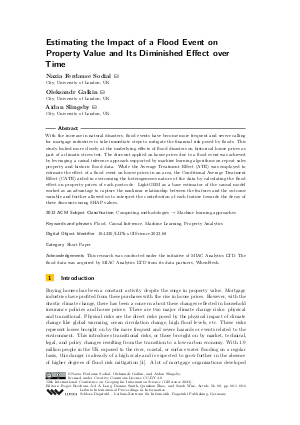LIPIcs.GIScience.2023.68.pdf
- Filesize: 2.73 MB
- 6 pages

 Creative Commons Attribution 4.0 International license
Creative Commons Attribution 4.0 International license

With the increase in natural disasters, flood events have become more frequent and severe calling for mortgage industries to take immediate steps to mitigate the financial risk posed by floods. This study looked more closely at the underlying effects of flood disasters on historical house prices as part of a climatic stress test. The discount applied on house prices due to a flood event was achieved by leveraging a causal inference approach supported by machine learning algorithms on repeat sales property and historic flood data. While the Average Treatment Effect (ATE) was employed to estimate the effect of a flood event on house prices in an area, the Conditional Average Treatment Effect (CATE) aided in overcoming the heterogeneous nature of the data by calculating the flood effect on property prices of each postcode. LightGBM as a base estimator of the causal model worked as an advantage to capture the nonlinear relationship between the features and the outcome variable and further allowed us to interpret the contribution of each feature towards the decay of these discounts using SHAP values.




Feedback for Dagstuhl Publishing